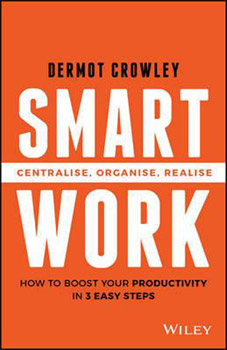Smart Work

Smart Work
The modern workplace is full of meetings, competing priorities, increased work-loads, and a deluge of emails and tasks all marked URGENT. Technology was supposed to streamline our workflow, but without utilising it properly has made our day to day activities more time consuming than ever.
In the new book, Smart Work (Wiley $22.95), productivity expert Dermot Crowley shows how to turn technology to your advantage and develop a simple, modern and sustainable productivity system that works. Readers will learn to:
Centralise commitments and priorities in one place
Organise your inbox and email actions
Realise goals and make time for the work that actually matters
Filled with practical, easy to implement tips, Smart Work is the busy professional's guide to getting organised in the digital workplace.
Sydney-based Dermot Crowley is a productivity author, speaker, coach, trainer and thought leader. A 20-year veteran of the productivity training industry, he is the creator of the On Time, In Control productivity program and is the Founder and Director of Adapt Training Solutions. His passion for helping modern executives work more productively with their technology has led him to work with many senior executives and leadership teams in organisations such as the Commonwealth Bank of Australia, Citi, Deloitte, Allens Linklaters and KPMG.
Smart Work
Wiley
Author: Dermot Crowley
ISBN: 9780730324362
RRP: $22.95
Interview with Dermot Crowley
Question: What inspired you to write Smart Work?
Dermot Crowley: I always believed I had a book in me. The problem was, I was always too busy to write it. The irony of expertise! A couple of years ago my mentor, Matt Church (himself the author of 7 books) challenged me on this. He knew I could do it, and that it would add real value to my positioning as a thought leader in the productivity space. But he also saw that I was using -busy' as an excuse. Three months later I had a book draft and a publishing deal! My vision for Smart Work was to bring a simple productivity methodology to as many people as possible. Everyone deserves to be productive!
Question: How has technology made our day to day activities more time consuming than ever?
Dermot Crowley: I don't necessarily believe that technology has made our day to day more time consuming. It is what we use the technology for that causes this problem. The technology is the problem and the solution at the same time. Take email as an example. Email was created to be used on a technology platform, and now we are way too obsessed with and driven by our inbox. But if we learned how to leverage our technology, and were a bit more disciplined about how we used email, we would be far more productive. In my experience, most people only use about 20% of the capability of the productivity technology they have at their fingertips!
Question: Can you please provide your top tips to organising our email inbox?
Dermot Crowley: Firstly, treat your inbox as a post box, just like the one outside your house. This is where you receive the mail, but it is not your filing cabinet for important papers, and it is not your system to remember to pay the bills(I hope). Don't use your inbox as a filing system or a to do list. The following tips might also help:
Clear your Inbox to zero on a weekly basis
Set up a simple filing system for emails you want to keep – one folder or less than ten
Schedule actions emails as tasks or in your calendar to manage them as priorities
Reduce the noise coming into your inbox. Delete junk automatically, and use rules to auto-file informational emails
Check your emails proactively through the day, and turn off your email alerts
Question: What do you hope readers take from Smart Work?
Dermot Crowley: I guess firstly that you need to leverage technology to stay organised in today's workplace. We can't just apply 20th century methodology to 21st century productivity issues and hope to stay organised.
Secondly, you have the tools at your fingertips already. MS Outlook, Lotus Notes or Gmail can be used to apply the Smart Work system easily.
And lastly, getting your actions organised and your inputs under control should lead to more time to focus on realising your outcomes. You only have a limited amount of time – use it for the important work that will really make a difference. I learnt that the hard way writing the book!
Interview by Brooke Hunter
MORE



